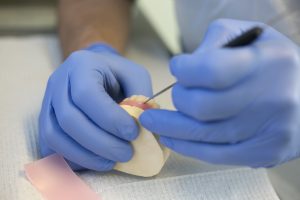
Here at Bespoke Dental Care we offer a direct denture service from our clinical dental technician, Colin. With our onsite laboratory and a referral from a dentist a clinical dental technician is able to see patients directly, this means that there is no middle man and the look and fit of our dentures are generally more accommodating for patients as Colin can see exactly what the patient needs are.
We offer a range of denture options including acrylic and cobalt chrome (metal). Colin is also able to incorporate unique characteristics into dentures and even copy original teeth so that they blend in to your smile as much as possible.
We do also offer a walk-in denture repair service.
Contact us for more information or to book in for a consultation with Colin.
What are dentures?
Dentures are removable false teeth made of acrylic (plastic), nylon or metal. They fit snugly over the gums to replace missing teeth and eliminate potential problems caused by gaps.
What is the difference between complete and partial dentures?
Complete dentures (full set) are required if all the upper or lower teeth need to be removed and replaced. Partial dentures replace just one or a few missing teeth.
Why should I replace missing teeth?
Improving your appearance and confidence is one reason. Another is that the gap left by a missing tooth can mean greater strain on the teeth at either side. Your bite may also be affected, because the teeth next to the space can lean into the gap, allowing food to get trapped, potentially leading to decay and gum disease. Your speech can also be affected.
How are complete dentures fitted?
The denture will usually be fitted as soon as your teeth are removed, which means you won’t be without teeth. However, they will probably need relining or remaking after a few months, if the gums and bone alter in shape. Dentures can be made and fitted either via a dentist or directly by a clinical dental technician who will take measurements and impressions of your mouth.
How are partial dentures fitted?
A partial denture is a plastic or metal plate with a number of false teeth attached to it. It usually clips securely onto some of your natural teeth via metal clasps and can easily be removed. An alternative is a fixed bridge where crowns are put on the teeth either side of the gap and joined together by a false tooth that’s put in the gap. Your dentist will advise the best type for you.
What will it all cost?
Costs will vary according to the type of denture required and materials used. You will be given a written estimate and treatment plan before beginning any dental treatment.
How do I look after my dentures?
The general rule is: brush, soak, brush. Always clean your dentures over a bowl of water or a folded towel in case you drop them. First brush your dentures to help remove any food debris or denture fixative. Then soak in an effervescent denture cleaner to remove stubborn stains before brushing the dentures again, this should be done twice a day as you would your own teeth.
Should I take my dentures out at night?
Dentures may feel a bit strange to begin with, but you’ll soon get used to wearing them. At first, you may need to wear your dentures all the time, including while sleeping. In time, removing your dentures at night gives your mouth a chance to rest but it is important to leave them in water to prevent any warping or cracking. Leaving dentures in at night permanently can put you at risk of developing bad tastes or fungal infections in the mouth.
Can I eat the same foods with dentures?
When you first start wearing dentures, you should eat soft foods chewing slowly, using both sides of your mouth. Avoid chewing gum and any food that’s sticky, hard or sharp. Then gradually return to your normal diet. Never use toothpicks.
Do I need to use a denture adhesive?
If your dentures fit properly, you shouldn’t necessarily need to use denture fixative (adhesive). However, if your jawbone has shrunk significantly, adhesive may be the only way to help retain your dentures. Always follow the manufacturer’s instructions and avoid using excessive amounts.
How long do dentures last?
Your dentures can last several years if you take good care of them. However, your gums and jawbone will eventually shrink, which means the dentures can become loose or worn which may call for a new one to be made. If poorly fitting or worn dentures aren’t replaced, they can cause great discomfort and lead to mouth sores, infections or problems eating and speaking.
